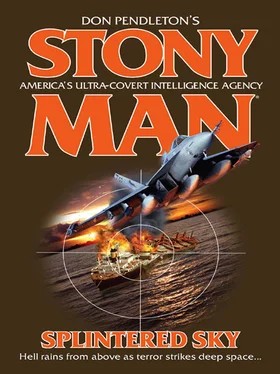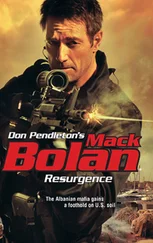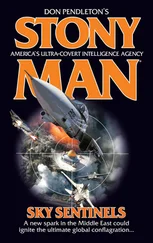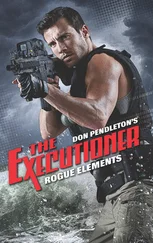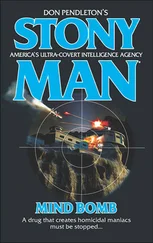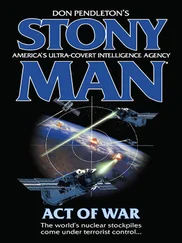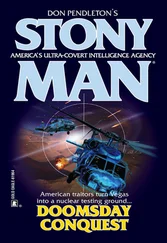1 ...6 7 8 10 11 12 ...15 “Added to the SAD-style night vision, it does look damning,” James, a former San Francisco police officer, agreed. “But circumstantial evidence doesn’t hold up. We need something stronger.”
“Try this image we’ve got from an NRO satellite,” Price added. An image appeared on the screen, a photograph of a launch facility. The image enlarged and focused on a corner of the launch campus. “It was observing a facility referred to in the records as the Phoenix Graveyard.”
“Glad I’m not superstitious,” McCarter muttered.
“Looks familiar,” Gary Manning said, cutting off his friend’s gloomy proclamation. “The same kind of terrorist combat training facilities that litter Asia from Syria to Pakistan.”
“Too disorganized to be conventional army barracks, and this tank,” Encizo mentioned. “I recognize that kind of water tank. There’s one at Cape Canaveral.”
“A zero-gravity, space-suit training tank,” James agreed. “The water duplicates the relative lack of gravity, as well as operating in a self-contained atmosphere, preparing people for extra-vehicular activity.”
“And it’s not for astronauts, because this is a second tank in addition to one for the Chinese astronauts,” Manning said. “The Chinese don’t normally send people into orbit, and when they do, it’s on the QT. Mostly, their facilities are rented out to launch satellites, but they do have their own space program, complete with a knockoff of the shuttle that’s a little better than the Russians’.”
“So they’re training terrorists for zero-gravity combat in a space suit?” McCarter asked. “That narrows down the targets considerably.”
“The International Space Station,” Hawkins concluded. “Isn’t there supposed to be a shuttle launch and rendezvous?”
“It’ll be going up in three days,” Price answered. “Take a look at this setup here…”
The photograph increased in detail, and it was a maze of tires. Utilizing computer wizardry, the picture blended with the layout of the ISS. The commandos of Phoenix Force were immediately aware of the PVC pipes that simulated the crawl-spaces between the station’s various modules.
“Still circumstantial evidence,” James stated. “It’s too thin to make a rush into the People’s Republic.”
“One more bit of evidence. We did a sweep for radiation on the scene,” Price concluded. “We picked up high-energy gamma radiation signatures.”
James winced and McCarter knew that the Phoenix Force medic had heard something terrible. McCarter checked his memory for problems that would have a high gamma radiation signature.
“Iridium 192,” McCarter stated.
“You got it, David,” James answered. “It’s a very credible threat for a dirty bomb. External exposure to Ir-192 pellets can cause radiation burns, acute radiation sickness or even death.”
“They wouldn’t need explosives,” Manning interjected.
“What do you mean?” McCarter asked.
“Iridium is a highly dense metal. We’re talking a higher friction resistance than the toughest steels around. Plop it into the atmosphere on a proper trajectory, when it hits the ground, even the pencil-size sticks of Ir-192 used for industrial welding gauges will survive and merely fragment,” Manning said. “Put it in a barrel, and reentry will heat the drum up enough that when it strikes a solid surface, like a building, it’ll pop like a balloon, spitting shards over the center of a city.”
“A radioactive shotgun round,” McCarter mentioned. “Anyone not killed by a splinter of the stuff would receive a dose of radioactive shrapnel. With the amount of casualties possible from an air burst over a city, you’ll have hundreds, perhaps thousands, suffering from both fragments and the radiation they put out.”
“They wouldn’t need a barrel, and they’d have their delivery systems on the ISS,” Hawkins noted. “Right now, our shuttle is going up to augment the ISS satellite maintenance duties. At any time, there’s a half dozen satellites docked to the station, and there are remote operating thrusters to return the satellites to their proper orbits. It’d only take a minor bit of programming to turn a satellite into a weapon, especially with a load of Ir-192 in its guts.”
McCarter took a deep breath. “When do we take off, Barb?”
“There’s not too much activity now, but the timing of the hit on Burgundy Lake with the launch of the current shuttle mission is just too suspicious,” Price told them. “If it’s Beijing looking to make an official move, or renegades at work, we need to get you in the air now.”
“What’s our ride?” McCarter asked.
“The Gulfstream’s been refueled by naval aviation, but the closest approach to the Chinese launch facility is in Thailand. The Gulfstream’s not set up for HALO, nor a stealth border crossing, so you’ll transfer to a dedicated craft in Thailand, and then infiltrate the Phoenix Graveyard, approximately 250 miles west of Canton,” Price responded. “I’ll arrange for gear to be ready when you get there. Good luck.”
“We’ll need it,” Hawkins muttered.
“All right, team, load up,” McCarter ordered.
Yuma, Arizona
Leon Paczesny was turned over to federal Marshals, glad to be away from the big, menacing blond cop who liked to pound on his arm. It had only taken a gentle reminder, dozens of color photographs of the corpses Able Team had created the night before, to ensure that Paczesny was going to keep their part in the apocalyptic border-crossing quiet. Hal Brognola had a Justice Department detachment, independent of the Burgundy Lake investigation, take care of the turncoat. The deal was a simple one. Paczesny would eventually be turned over by Brognola’s baby-sitters, and the traitor would confess to his part in the operation.
In return for not contesting his espionage charges, he’d get to live. It would be an existence in an eight-foot-by-five-foot cell until he was old and decrepit, but it would be life. Any deviation from the deal would result in pieces of Paczesny being mailed to all of his living relatives, each part harvested from his screaming body.
Lyons told the traitor that they had excellent life support machines. He amended the threat with a story of the last fool who blew his free pass to continued existence. With grudging respect, Lyons noted that the turncoat had survived until he was trimmed down to an eyeless, earless, noseless head attached to a torso that had been carved down to just above the navel.
“It was the most incredible six months of my life, slicing a traitorous bastard up like lunch meat,” Lyons confessed.
It was all a lie, but Paczesny didn’t know that.
“Intimidation has a name,” Schwarz quipped after Paczesny left in the back of a Justice Department SUV. “Lyons. Carl Lyons.”
The Able Team leader snorted. “This isn’t a game, Gadgets.”
“No, you sure talk a good nightmare,” Schwarz answered.
“I don’t like it, but when it comes down to saving noncombatants and breaking apart some thug who’s in on a bunch of deaths I can prevent…”
“The needs of the many, bro,” Schwarz replied. He bopped the ex-cop on the shoulder.
Lyons looked at his watch. It was just after dawn. “Please. It’s too early for that Star Trek crap.”
“Speaking of which,” Blancanales interjected, “what’s the plan? Stick around poking at any support structure for the mercenaries who hit Burgundy Lake, or do we go to Florida?”
Lyons frowned. “We’ll spend a few hours here snooping around. We might hit something, but I doubt that the raiders’ backup would stick around longer than sunset.”
“That’s including the guy who ran off,” Blancanales reminded him.
Читать дальше
